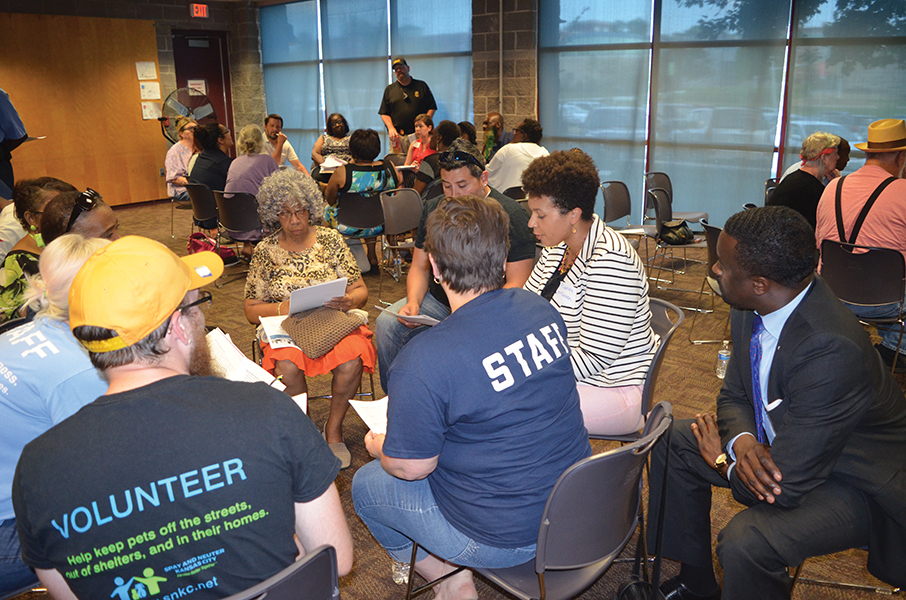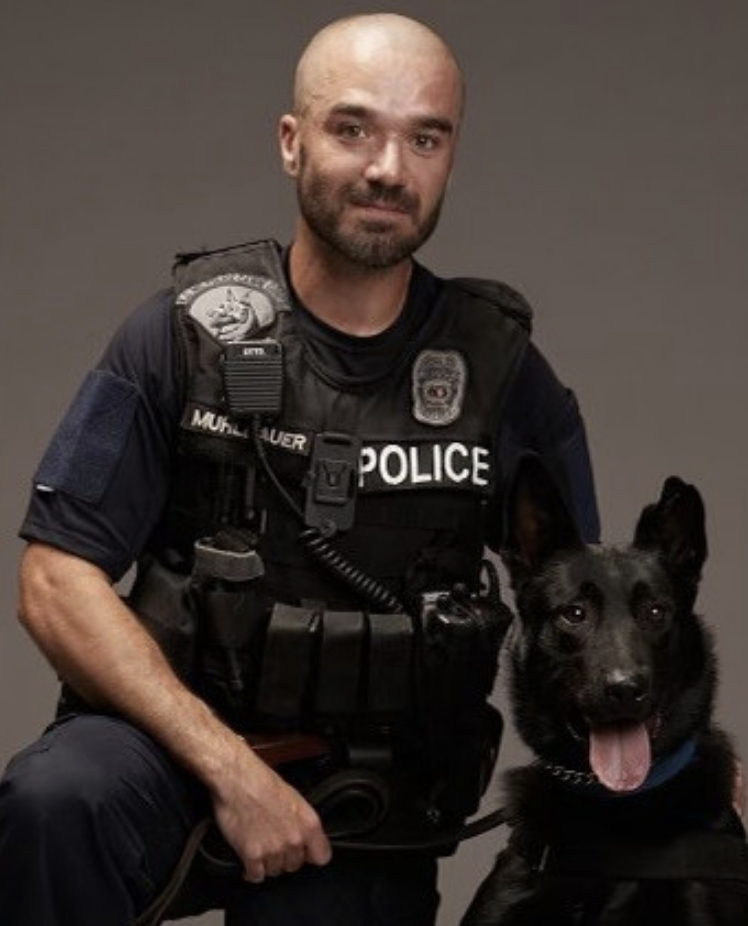Paul Thompson
Northeast News
When the City of Kansas City, Missouri held a groundbreaking ceremony for its new Swope Park animal shelter on Tuesday, June 26, 23 smiling faces stood behind golden shovels for the occasion – including one furry-faced mascot wearing a checkered blue bow tie.
Notably absent from the celebration were any representatives from the entity that currently enforces Kansas City’s animal code: the Animal Health and Public Safety (AHPS) department, commonly referred to as animal control. According to multiple sources from within the department, animal control wasn’t even invited to the celebration, which was hosted by the City’s animal shelter provider, Kansas City Pet Project (KCPP).
The snub was just the latest sign that the relationship between the City’s outsourced animal shelter and its animal control operators remains untenable. The two entities – which are still tentatively scheduled to co-exist at the new shelter – have been publicly and privately at odds for years, and the rift is only growing.
An audit of AHPS was released in August of last year, and the audit’s 17 recommendations for the improvement of operations were presented to the City Council’s Neighborhoods and Public Safety committee on September 27, 2017.
By November 29 of that year, City Councilwomen Jolie Justus and Teresa Loar were co-sponsoring a resolution that would have directed the City Manager to look into the privatization of animal control services over a 90-day period.
“We believe that it creates efficiencies and actually saves taxpayer dollars by bringing all services under one roof,” Justus said at the time. “It allows the same training, education, and best practices that are currently in place for our shelter operations to be expanded throughout our field operations.”
Though no specific entity was named in the resolution, KC Pet Project representatives acknowledged at the time that they would be interested in taking over animal control services if the opportunity arose.
“We are excited about the potential opportunity, but it’s still very much in the early stages,” said Tori Fugate, Director of Marketing and Communications for KC Pet Project.
The resolution presented on November 29 drew the attention of a handful of concerned animal control officers, as well as the municipal employee’s union. American Federation of State, County and Municipal Employees (AFSCME) Local 500 President Robert Patrick spoke passionately at the committee meeting at which the ordinance was introduced, where he claimed that the resolution violated the collective bargaining agreement between animal control workers and the City.
“Today you bring me here because of a direct violation of our contract that was negotiated through our collective bargaining agreement. The City never notified the union of their intent to outsource, which is Article 24, Section 1 and 2 of our contract, page 27,” Patrick said. “It is our intent, by notifying the City Manager and Mayor, and by speaking here today, (to put) the City on notice that we wish the contract to be upheld and enforced.”
Crucially, the resolution was announced before a six-month Audit Report Tracking System (ARTS) presentation could be given for the AHPS audit; an ARTS report typically allows an audited entity the opportunity to show how it has implemented recommended changes in the six months following an audit.
If it had been approved, the resolution could also have subverted the City’s best practices related to public bidding processes.
The topic of the City’s bidding policies was recently tackled by the City Auditor’s Office. On March 21, KCMO City Auditor Doug Jones appeared before the Finance and Governance committee to present a scope statement about an upcoming audit regarding the Implementation of Contract Selection Recommendations. In this presentation, Jones described how the contract selection process should properly play out.
Jones suggested that the City’s bidding process should ensure the equitable treatment of contractors, a consistent selection process and contracts that are awarded to the lowest and best bidder.
The timing of the resolution – coming before a six-month response to the audit findings could be presented – left at least the impression that animal control services would eventually come under the control of KC Pet Project.
Fast forward to the summer of 2018, as the City is hosting public input sessions to solicit feedback on potential changes to Kansas City’s animal code ordinance.
At the first input session – on Monday, July 9 at Gregg/Klice Community Center – both Spay and Neuter Kansas City (SNKC) and Kansas City Pet Project (KCPP) made it clear that they are determined to have a voice as the City of Kansas City, Missouri solicits that community input.
“Both organizations definitely have invested a lot into the betterment of pets in the community, and so I would hope that investment allows us the opportunity to have a voice at the table on it,” said Brett Toellner, co-founder of Kansas City Pet Project.
Still, AHPS officials – including animal control staff – didn’t feel entirely comfortable with the proceedings.
“I see a lot of animal welfare people in the room,” said AHPS Division Manager Patrick Egberuare. “I really want input from regular citizens.”
The community conversation began with the distribution of several packets and information sheets, most of which were created by KC Pet Project and Spay and Neuter Kansas City.
KCPP representatives were scattered throughout the first community input session, soliciting feedback about potential changes to the City’s sprawling animal code. If they get their way, KCPP could be enforcing those rules by the time the organization moves into its new Swope Park headquarters, likely in early 2020.
It shouldn’t be a surprise, then, that AHPS officials were keeping a close eye on the July 9 community input session. After all, their jobs are on the line.
“I don’t mind them passing out the fliers, but the main goal, like I said earlier, is to get as much input as possible from residents to revise the ordinance,” Egberuare said.
Kate Regnier Bender, the Office of the City Manager’s Deputy Performance Officer, ran the July 9 meeting at Gregg/Klice. She’ll serve in the same capacity for the final animal code public input sessions, scheduled for August 6 and August 22. The focus of the meetings are to identify potential changes to the City’s animal code that can attract a broad consensus from taxpayers.
To Bender, the fact that SNKC and KCPP presented literature to attendees will only serve to strengthen the process. A more informed participant pool, in other words, can provide more concrete feedback.
“They’re involved in the stakeholder group overseeing the code change, so I actually thought it was useful for them to have this one-sheet that kind of summarizes their opinions,” Bender said.
Breakout sessions took up the majority of the 3rd District meeting on July 9, and each of the five groups contained at least one member from KCPP or SNKC. One of the groups featured two members with KCPP name tags, two wearing clothing identified with SNKC logos, 2nd District Councilwoman Loar, a facilitator, and two individuals without any outward affiliations.
Toellner suggested after the input session that the City’s animal codes are long overdue for a makeover.
“The animal codes haven’t been updated, really, since 2006,” Toellner said. “So a lot of things have changed since then.”
Toellner further noted that key takeaway from the August 2017 audit of the Animal Health and Public Safety department was that the City needs to stop using punitive actions against pet owners. Steps in that direction were also discussed during the session.
“A lot of the changes that are being proposed are eliminating some of the punitive measures that are out there: eliminating the mandatory spay/neuter ordinance for pit bulls, not enacting a mandatory spay/neuter ordinance for all pets, but also allowing for the Trap/Neuter/Release of community cats,” Toellner said.
To Toellner and others, KC Pet Project has valid reasons for wanting to take over the City’s animal control services. There’s a concern that AHPS focuses too much on punitive actions like ticket-writing, and not enough on measures that actually help animals. Critics also view AHPS as an entity that is too entrenched with bad habits to effectively implement the changes necessary to improve animal control operations; in their eyes, the City entity has already failed to do so. The August 2017 audit merely provided confirmation of the top-down issues of the department.
Asked whether the relationship between Kansas City Pet Project and the City’s Animal Health and Public Safety Department has improved at all in the past few months, Toellner’s tempered response was telling.
“I think it’s more or less the same as it’s always been,” Toellner said. “I don’t know that anything has changed.”
The next public meeting about proposed animal code ordinance changes will be held at 6 p.m. on Monday, August 6 at Southeast Community Center (4201 E. 63rd St.) The final session will be held at 6 p.m. on Wednesday, August 22 at Northlands Neighborhood Incorporated, (4420 NE Chouteau Trafficway, Suite 100).
To provide feedback online, area residents are encouraged to visit the City’s public input page.



















